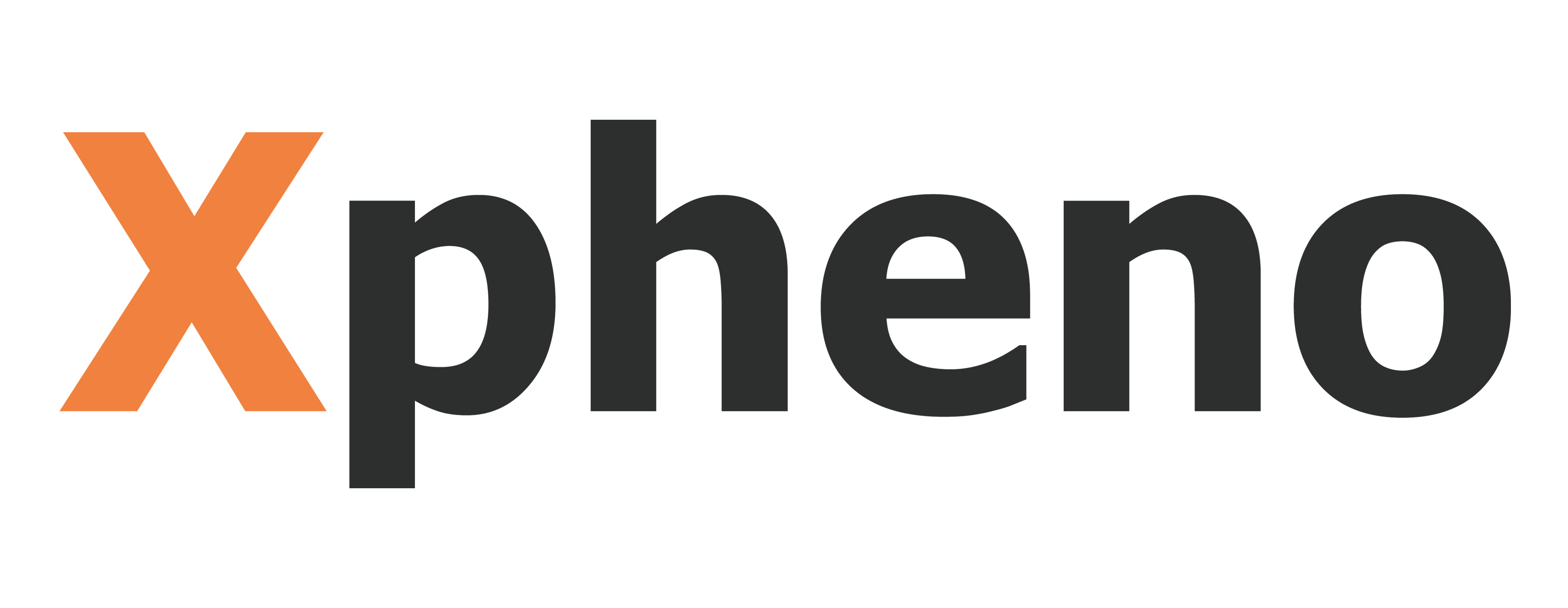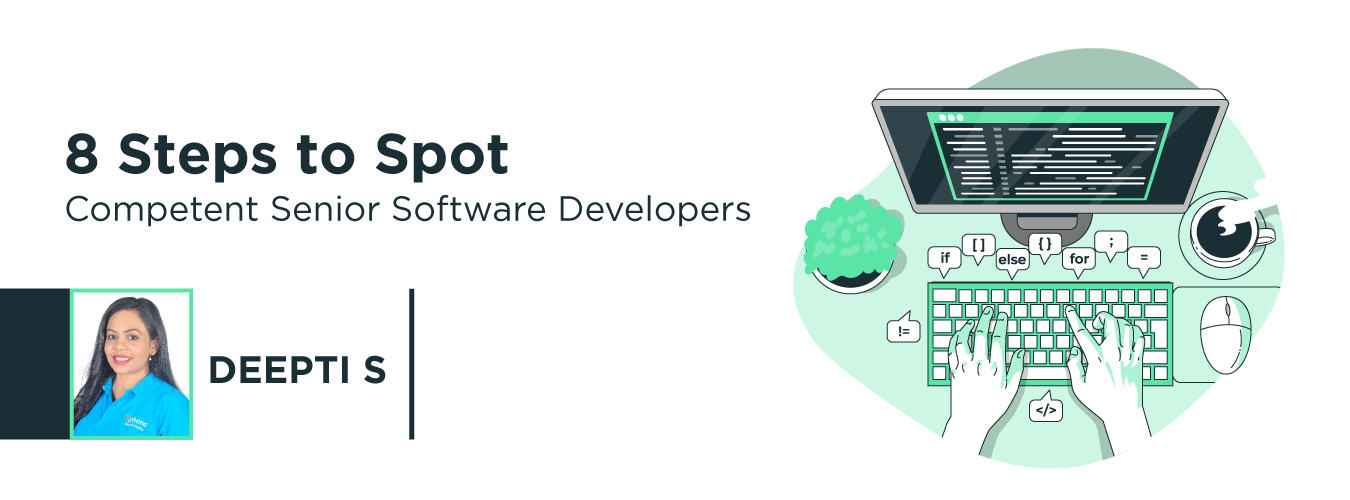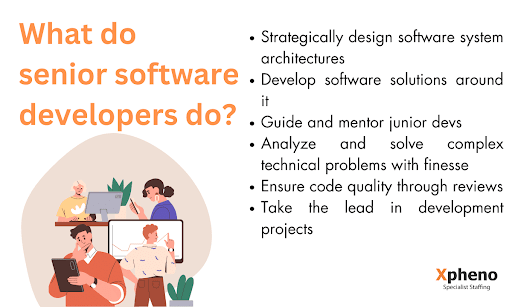8 Steps to Spot Competent Senior Software Developers
Hiring the right senior talent for your business is critical. However, anyone who has ever had this responsibility understands the massive challenge of hiring senior software developers. Finding senior developers with the right combination of skills, experience, and cultural fit for an organization is no less of an art and a science.
Within the limited pool of qualified engineers, we have to recognize the special and often underrated qualities that set senior software candidates apart. Identifying these gems in a crowded talent pool is not an easy feat!
In this post, let’s explore some strategies and steps to spot senior software developers who make a significant impact on tech teams and organizations.
The role of a senior software developer
A tech team might need a mix of senior, mid-level, and junior developers. Although these are all just labels, they do serve a purpose. That is to communicate the set of expectations for a particular role. When it comes to projects like architecting a major upgrade to a legacy system, the choice is to go for senior developers.
To put it plainly, senior software developers identify tasks in the software development cycle, execute those tasks, review and debug code, collaborate with internal teams, and ensure that software is up-to-date with the latest technologies and business requirements.
They are also expected to lead engineers and developers and provide them with technical guidance, mentorship, and project management expertise to deliver cutting-edge software projects. Let me elaborate on how recruiters spot senior software developers.
Recruitment of Senior Software Developers
Hiring top-notch software developers is a mix of social networking, process management, and gut feeling. First off, for a senior software developer position, we cannot expect the massive response that we get for entry-level positions. Positions have to be advertised rigorously, and candidates have to be invited through various channels including job portals, websites, and social media.
One of the toughest parts is evaluating those intangible qualities that make senior software developers truly exceptional. How do you figure out if they’re innovative and creative thinkers? Are they good leaders and team players? Can they provide and handle feedback? And what about their moral compass? These are all crucial but often elusive attributes that you need to assess.
Executive Search assignments are characterized by unique expectations and challenges that require unblocking critical dimensions of the search. Therefore, enterprises hire technical recruiters, use employee referrals, and other inbound recruitment techniques to hire competent senior software developers.
Steps to Spot Competent Senior Software Developer
Now, I’m not saying there’s a magic formula for hiring such competent senior developers, but there are some proven techniques to help you find the best of the best. So, let’s dive into the process.
Step 1: Build a Strong Pipeline
Before you even get to the interview stage, you need a pool of potential candidates. Recruiters can cultivate their talent pool through professional networking, candidate databases, and compelling job adverts.
Recruiters scout the field for people who’ve handled big projects, possess top-notch technical and people skills, a steady work history, and a track record of accomplishments.
Once you create a network of quality people, you can tap into that network for more leads and referrals.
But there are other sources too. Check out developer blogs and online tech forums. You can learn much about a candidate’s skills and problem-solving approach from their online presence.
Open-source contributors are also a treasure trove. Sites like GitHub and SourceForge can help you spot talent and even check out their code before making contact.
The goal is to have some level of vetting before you go for a pre-screening interview.
Step 2: Delve into their Work Experience
When assessing a candidate’s suitability for a senior software developer role, it’s crucial to examine their project experience, contributions to open-source projects, and any relevant certifications.
We delve into their work history to evaluate:
- Relevant Experience: How long have they worked in the software development field?
- Hands-On Expertise: Are they a generalist or specialist in terms of software skills?
A solid history of achievements across different projects is a good sign of a suitable candidate.
Also, determine whether they have experience with:
- Client Interface: Proven ability to engage with end clients directly and effectively.
- Multi-Functional role: Familiarity working in multiple roles with cross-functional teams.
- Hackathons: Participation to highlight problem-solving skills.
- End-to-End Involvement: Start-up experience often brings end-to-end project exposure.
Senior software developers need to understand the client’s world, industry, and pain points, aiming to enhance processes and ease others’ tasks. A developer’s prior experience in the above-mentioned aspects enables them to suggest improvements that benefit both development and UX while keeping clients satisfied.
Besides, you can ask for a list of open-source projects the candidate has worked on. Check out their code and be ready to discuss their design choices, coding styles, and patterns. Experienced programmers understand that well-structured, maintainable code is crucial for a project’s success. Therefore, they prioritize code quality and follow best practices religiously.
Above all, candidate should be able to give real-life examples of hurdles they’ve cleared in their past projects.
A few important factors recruiters focus on:
- The diversity of domains they have tacked
- Assessing candidate’s business knowledge
- Whether they are in touch with the changing technology trends
If a candidate attends conferences and technology meet-ups, it indicates that they are probably in touch with the changing technology trends.
Step 3: Assess Technical Skills
Technical proficiency is of course a prerequisite for the role of a Senior Software Developer. They have a wide-ranging skill set with a deep understanding of programming languages, frameworks, and technologies relevant to the organization’s needs.
Senior Software candidates also must possess skills related to infrastructure management (SSH, Docker, serverless architectures) and performance optimization (network performance, load balancing). Since they are responsible for building robust, secure applications, senior devs should also showcase an understanding of security principles to avoid common vulnerabilities.
To evaluate their technical chops, companies offer programming challenges to software candidates. There are online resources with coding challenges that can help. Websites like Hackerrank, Project Euler, and Beatmycode offer a plethora of problems to choose from.
But here’s the kicker: too often, we get stuck in the weeds of technical minutiae. We end up grilling candidates on syntax and coding details instead of really digging into their problem-solving abilities and leadership skills. It’s a common trap when hiring senior software developers, and we need to avoid it.
So, don’t get too hung up on online testing scores.
Step 4: Evaluating Communication Skills
Since senior developers need to effectively communicate with cross-functional teams, junior team members, and non-tech stakeholders, communication matters. Senior Developers need to convey ideas clearly whether in code or in words, ensuring everyone is on the same page.
So, during the interview, assess their verbal and written communication and pay attention to relevant examples of how they demonstrated leadership skills in the past.
Verbal skills are easy to gauge in person or over the phone. See how they articulate their thoughts. But written communication is also vital. You can ask for technical writing samples, preferably in advance. This gives you a chance to review their writing style and technical clarity. Some candidates might be put off by this request, but it’s a good filter.
During technical interviews, coding challenges and discussions about past projects, a senior developer should be able to articulate their approach to problem-solving and demonstrate how they’ve tackled intricate issues in the past.
Step 5: Independence and Ownership
Independence and ownership are 2 important characteristics that reflect the maturity of a developer. Senior Devs take charge of projects, digging into planning and creative aspects, aligning with client needs, and saving time and money by raising red flags early on.
They are able to execute and manage the entire software cycle (SDLC).
When a project faces challenges, seniors step up to find solutions and don’t shy away from admitting mistakes. When faced with a critical bug that is stumping the entire team, they use their analytical skills to identify the root cause within hours, saving the project from a potential disaster.
Senior Devs also possess the wisdom to go against the grain and opt for the best course of action, even if it’s not the popular choice. Instead of blindly following the crowd, they rely on their experience and deep knowledge to make decisions.
To assess their independence and accountability, ask them about instances in their work experience when they:
- Initiated action to address a critical problem.
- Supported the team despite differing opinions.
- Explored emerging technologies
Step 6: Stability and Handling Moral Dilemmas
Now, here’s a tricky one: assessing a candidate’s stability and moral compass. A shaky and unreliable candidate can be a pricey blunder for a company. Likewise, strong developers can wreak havoc if they lack ethics.
Stability of a candidate reflects in their work history. If a candidate profile shows frequent job changes over a short period, that could be a concern.
On the other hand to assess their ethics, you can present them with a moral dilemma that doesn’t have a clear right answer. It should be a bit messy, just like real-life ethical challenges.
For example, imagine a subcontractor overcharging, and your boss says to keep quiet. What do they do? These questions can reveal a lot about a candidate’s ethics and priorities.
Step 7: Getting to Know the Real Person
Finding a senior software developer who aligns with organization’s culture is vital for long-term success. It’s essential that they work harmoniously with the existing team and share the organization’s vision and mission.
But let’s face it; you can’t truly know someone until you’ve worked with them. However, you can get a feel for their personality and temperament during the interview. Look for opportunities to provide constructive feedback and see how they react. Are they defensive or open to improvement?
Engage in some non-technical chit-chat for the first few minutes of the interview. It can reveal a lot about their personality. And if they’ve got a sense of humor, that’s always a plus!
Ask questions like their career challenges, biggest mistakes, what they love and hate about software development and their ideal job. These questions dig deeper into their personality, confidence, and professionalism.
Step 8: Assessing Mutual Interest
Lastly, find out how interested they are in your company/client and the role. A candidate genuinely interested will have done their homework. They’ll know about the vendor/organisation and the role. They might even have researched you, the recruiter. So, ask what they know and what interests them. If they’re keen, they’ll ask questions too. A lack of questions can be a red flag.
Bottomline
Hiring top-notch developers isn’t a one-size-fits-all process. Finding the perfect match for the tech team and the organisations’s future goals is a journey that requires constant refinement. Every client and every project is unique, so find the path that suits the best for your mandate. Learn from your successes and failures along the way, and you’ll find those exceptional senior developers who’ll help the team soar.










